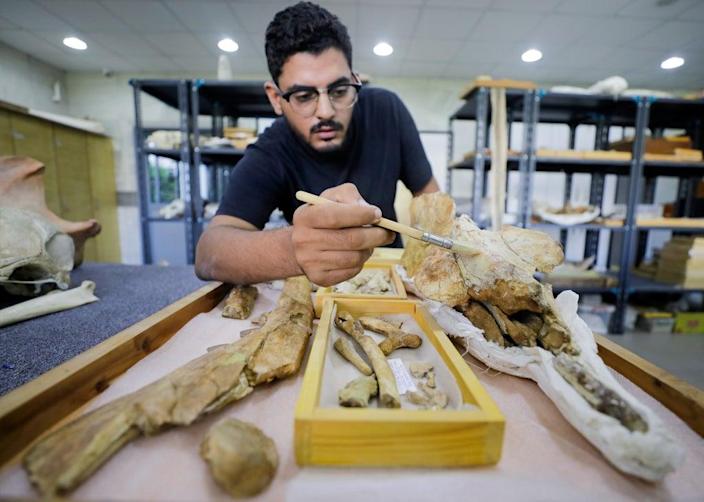
Scientists on Wednesday announced the discovery of a 43 million-year-old fossil of a previously unknown amphibious four-legged whale species in Egypt that aids in the study of whale migration from land to sea.
According to the Egyptian-led team of experts, the newly discovered whale belongs to the Protocetidae, a group of extinct whales that lived in the middle of that transition. Its fossil was discovered in middle Eocene strata in Egypt’s Western Desert’s Fayum Depression — a location that was formerly covered by sea and has yielded a wealth of findings indicating whale evolution before being analysed at Mansoura University’s Vertebrate Palaeontology Centre (MUVP).
The new whale, Phiomicetus anubis, had an estimated body length of three metres (10 feet) and a body mass of 600 kilogrammes (1,300 pounds), indicating that it was most likely a top predator, as per the researchers. Its incomplete skeleton revealed it to be Africa’s most primitive protocetid whale.
Abdullah Gohar of MUVP, lead author of a paper on the discovery published in the journal Proceedings of the Royal Society B said, ‘Phiomicetus anubis is a key new whale species, and a critical discovery for Egyptian and African paleontology.’
The genus name of the whale honours the Fayum Depression, while the species name honours Anubis, the ancient Egyptian god of mummification and the afterlife.
The genus name of the whale honours the Fayum Depression, while the species name honours Anubis, the ancient Egyptian god of mummification and the afterlife.

The big picture of early whale development in Africa has largely remained a mystery, despite recent fossil findings, the researchers added. Work in the area had the potential to offer new information regarding the evolution of amphibious whales into fully aquatic whales.
Also Read: Pakistan chemical factory fire claims 10 lives
The Fayum Depression’s discoveries ‘range from semiaquatic crocodile-like whales to giant fully aquatic whales,’ according to Mohamed Sameh of the Egyptian Environmental Affairs Agency, one of the co-authors.
Hesham Sellam, founder of the MUVP and another co-author said that the new whale has prompted issues about ancient ecosystems and directed study toward questions such as the origin and coexistence of ancient whales in Egypt.

Post Your Comments